
Post-transplantation Relapse in Lymphomas
-
If the lymphoma comes back (relapses) after having received a stem cell transplant, treatment options are very limited. Treatment of a post-transplant relapse is further complicated by residual side effects related to the transplant.
In the world of bone marrow and stem cell transplant, there are two types of transplants: autologous and allogeneic. Autologous (your own bone marrow or peripheral blood stem cells) and allogeneic (your own bone marrow and immune system are replaced with a new, healthy bone marrow or peripheral blood stem cells from another person) transplantation can be a very effective treatment for many patients with lymphomas. However, if the lymphoma comes back (relapses) after having received a stem cell transplant, treatment options are very limited. Treatment of a post-transplant relapse is further complicated by residual side effects related to the transplant, and impaired immune function secondary to ongoing immunosuppression or Graft-versus-host disease, amongst others.
Currently, there is no standard of care that outlines the optimal approach in that situation. Most experts would agree that patients with relapsed lymphoma after hematopoietic stem cell transplantation should be treated on a clinical trial. New targeted agents hold the promise to work for patients where conventional chemotherapy has failed. Access to clinical trials offers access to promising new agents that otherwise would not be available to patients. One such targeted agent is ASN002, a dual JAK and SYK inhibitor. Both the JAK and SYK pathways have been found to be overactivated in B-cell lymphomas secondary to mutations (gene alterations) in the lymphoma cells. Trials using drugs that block either the JAK or SYK pathway have shown promising early results for lymphoma patients.
At the Fox Chase Cancer Center – Temple Hospital Bone Marrow Transplant Program, we are excited to be one of currently only four U.S. institutions to offer our patients a clinical trial that explores the activity of ASN002 in patients with relapsed B cell lymphomas (ClinicalTrials.gov Identifier: NCT02440685). Our goal is to improve outcomes for lymphoma patients with post-transplant relapse through participation in exciting clinical trials with novel agents.
